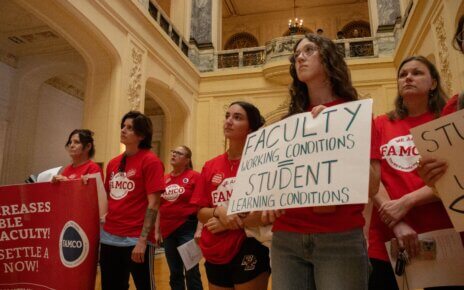Last month New Jersey ranked as the 7th worst state in the nation and the District of Columbia for money management in a study released by creditcards.com which measured residents’ average credit scores relative to median household income.
“I am actually really not surprised at all by this report,” said Jesus Santos, a grad student working on his Masters in Science and Education. “The other states probably are New York, and California. The reason why I am saying that I am not surprised is because it is so expensive to live in New Jersey. With the cost of housing, and the cost of clothes, and food and pretty much everything else in between it comes to no surprise that we rank so low on the list.”
According to The Fiscal Times, Santos is correct in his assertions. NJ has the highest effective property rate tax. The state relies heavily on property tax to fund local governments and schools, among other services, and the average property tax bill climbed to $8,161 last year, according to the state’s Department of Community Affairs.
Moreover, for the seventh year a study released by the University and Asbury Park Press in 2014, found that the state’s high property tax deters many residents from living in the state indefinitely. The study revealed that 50% of NJ residents would like to eventually move out of the state. Taxes and cost of living were the driving factor, with one third of residents saying they were very concerned about their retirement savings.
Bill White a TGI field service engineer at the University used an interesting analogy to translate his own opinion of the money management ranking. He said, “If you go on vacation and you have a cat you will leave it food. Throughout the three days that you are gone the cat will eat some of the food, but when you return there will still be food leftover. But if you have a dog and you leave it food, it will eat all of the food before you even hit the driveway.”
“In my opinion many people in New Jersey, myself included, are the dog. If we have money then we spend it, that’s why we are so bad at managing our money.”
Furthermore, the report labeled NJ as the 5th highest state in the nation for income. However, NJ is 19th in the nation for credit scores. This then shows that high income does not necessarily correlate with high credit scores.
For some this is not a surprising finding. “I think the low credit scores may be a function of the financial/housing crash. NJ home values dropped significantly, which is one reason we consistently rank as a state with one of the highest foreclosure rates as a percentage of mortgaged homes.” said Robert Scott, and Associate Professor of Economics.
“In the fourth quarter of 2015, around 12% of New Jersey mortgages were either late on payments or in foreclosure–about twice the national rate. I think the combination of a depressed housing market mixed with high unemployment rates for four years put households under financial stress resulting in low credit scores.”
Santos asserts that managing money is especially difficult for college graduates. “If you are a recent graduate, not only are you paying for your student loans, but you are most likely paying for everything yourself too, and with an entry level job it will not cover most of the things one has to pay for on a daily basis,” he said.
Santos believes that after graduating students are left with the option of using credit cards to pay for expenses that they cannot afford out of pocket. Unlike some of his friends he tried to use his credit cards only for necessities.
“With my credit card I was able to pay for the entire semester on my own without asking for loans, I paid for books, gas to commute from Paterson to Monmouth, and daily expenses such as food. In addition, it does not help that I was in a hit and run accident thus I had to replace my car and cover all the expenses that the accident had on me.”
Scott believes that there is hope for better rankings in the future. “I think that now that the unemployment rate is lower, and housing prices are recovering, and foreclosures are slowing that NJ will return to a more “normal” level of income to credit scores,” he said.
PHOTO TAKEN by Kiera Lanni




